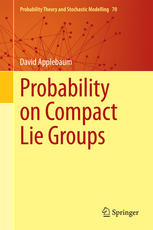

Most ebook files are in PDF format, so you can easily read them using various software such as Foxit Reader or directly on the Google Chrome browser.
Some ebook files are released by publishers in other formats such as .awz, .mobi, .epub, .fb2, etc. You may need to install specific software to read these formats on mobile/PC, such as Calibre.
Please read the tutorial at this link: https://ebookbell.com/faq
We offer FREE conversion to the popular formats you request; however, this may take some time. Therefore, right after payment, please email us, and we will try to provide the service as quickly as possible.
For some exceptional file formats or broken links (if any), please refrain from opening any disputes. Instead, email us first, and we will try to assist within a maximum of 6 hours.
EbookBell Team

5.0
110 reviewsProbability theory on compact Lie groups deals with the interaction between “chance” and “symmetry,” a beautiful area of mathematics of great interest in its own sake but which is now also finding increasing applications in statistics and engineering (particularly with respect to signal processing). The author gives a comprehensive introduction to some of the principle areas of study, with an emphasis on applicability. The most important topics presented are: the study of measures via the non-commutative Fourier transform, existence and regularity of densities, properties of random walks and convolution semigroups of measures and the statistical problem of deconvolution. The emphasis on compact (rather than general) Lie groups helps readers to get acquainted with what is widely seen as a difficult field but which is also justified by the wealth of interesting results at this level and the importance of these groups for applications.
The book is primarily aimed at researchers working in probability, stochastic analysis and harmonic analysis on groups. It will also be of interest to mathematicians working in Lie theory and physicists, statisticians and engineers who are working on related applications. A background in first year graduate level measure theoretic probability and functional analysis is essential; a background in Lie groups and representation theory is certainly helpful but the first two chapters also offer orientation in these subjects.